Taxation Law Assignment - Principles of Australian Taxation
VerifiedAdded on 2023/01/17
|12
|3477
|82
Homework Assignment
AI Summary
This taxation law assignment provides detailed answers to questions related to Australian taxation law. The assignment covers a range of topics including the Commissioner's procedure for computing effective life of assets, tax offsets, top tax rates, capital gains tax (CGT) exemptions and events, income tax calculation formulas, and the deductibility of expenses. It explores the differences between average and marginal tax rates, and defines consumption tax. The assignment then delves into specific scenarios involving tax deductions, including expenses incurred in income generation, partially business and personal expenses, and losses. CGT events F2 and B1 are explained, along with exemptions for permanent residents. Finally, it includes a capital gains tax computation example and discusses the tax treatment of prize winnings, referencing relevant case law and legislation such as the Income Tax Assessment Act 1997 (Cth).
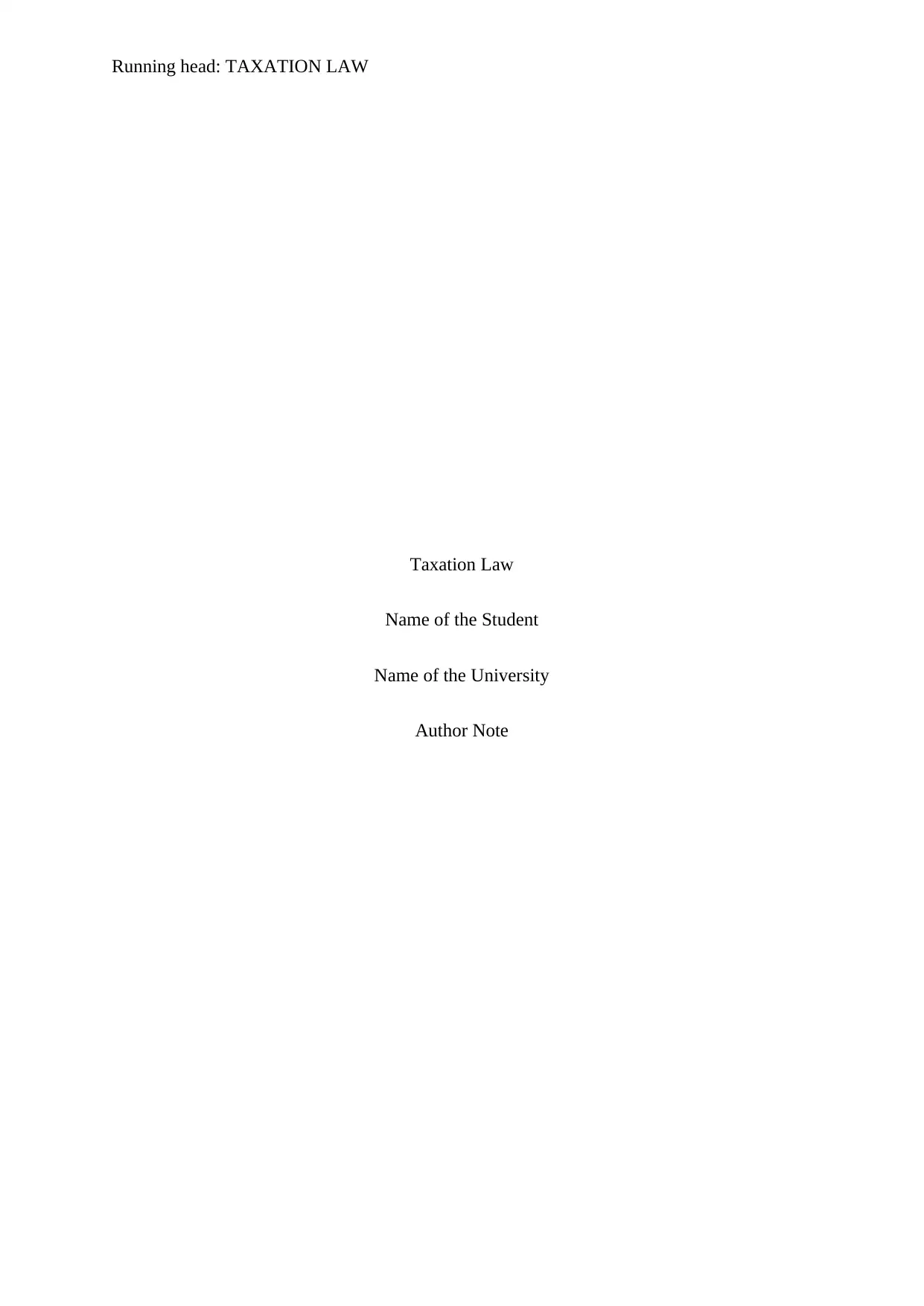
Running head: TAXATION LAW
Taxation Law
Name of the Student
Name of the University
Author Note
Taxation Law
Name of the Student
Name of the University
Author Note
Paraphrase This Document
Need a fresh take? Get an instant paraphrase of this document with our AI Paraphraser
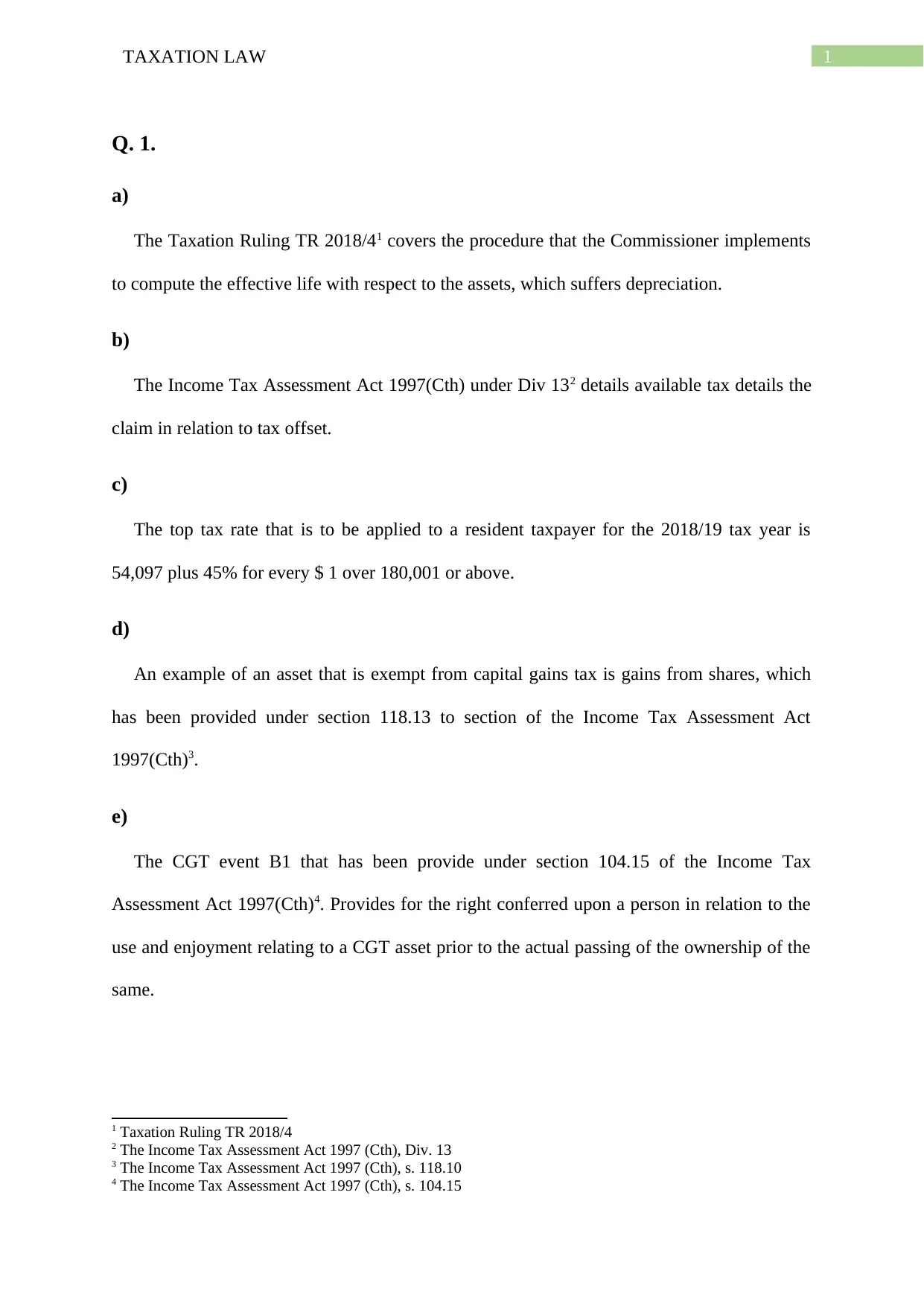
1TAXATION LAW
Q. 1.
a)
The Taxation Ruling TR 2018/41 covers the procedure that the Commissioner implements
to compute the effective life with respect to the assets, which suffers depreciation.
b)
The Income Tax Assessment Act 1997(Cth) under Div 132 details available tax details the
claim in relation to tax offset.
c)
The top tax rate that is to be applied to a resident taxpayer for the 2018/19 tax year is
54,097 plus 45% for every $ 1 over 180,001 or above.
d)
An example of an asset that is exempt from capital gains tax is gains from shares, which
has been provided under section 118.13 to section of the Income Tax Assessment Act
1997(Cth)3.
e)
The CGT event B1 that has been provide under section 104.15 of the Income Tax
Assessment Act 1997(Cth)4. Provides for the right conferred upon a person in relation to the
use and enjoyment relating to a CGT asset prior to the actual passing of the ownership of the
same.
1 Taxation Ruling TR 2018/4
2 The Income Tax Assessment Act 1997 (Cth), Div. 13
3 The Income Tax Assessment Act 1997 (Cth), s. 118.10
4 The Income Tax Assessment Act 1997 (Cth), s. 104.15
Q. 1.
a)
The Taxation Ruling TR 2018/41 covers the procedure that the Commissioner implements
to compute the effective life with respect to the assets, which suffers depreciation.
b)
The Income Tax Assessment Act 1997(Cth) under Div 132 details available tax details the
claim in relation to tax offset.
c)
The top tax rate that is to be applied to a resident taxpayer for the 2018/19 tax year is
54,097 plus 45% for every $ 1 over 180,001 or above.
d)
An example of an asset that is exempt from capital gains tax is gains from shares, which
has been provided under section 118.13 to section of the Income Tax Assessment Act
1997(Cth)3.
e)
The CGT event B1 that has been provide under section 104.15 of the Income Tax
Assessment Act 1997(Cth)4. Provides for the right conferred upon a person in relation to the
use and enjoyment relating to a CGT asset prior to the actual passing of the ownership of the
same.
1 Taxation Ruling TR 2018/4
2 The Income Tax Assessment Act 1997 (Cth), Div. 13
3 The Income Tax Assessment Act 1997 (Cth), s. 118.10
4 The Income Tax Assessment Act 1997 (Cth), s. 104.15
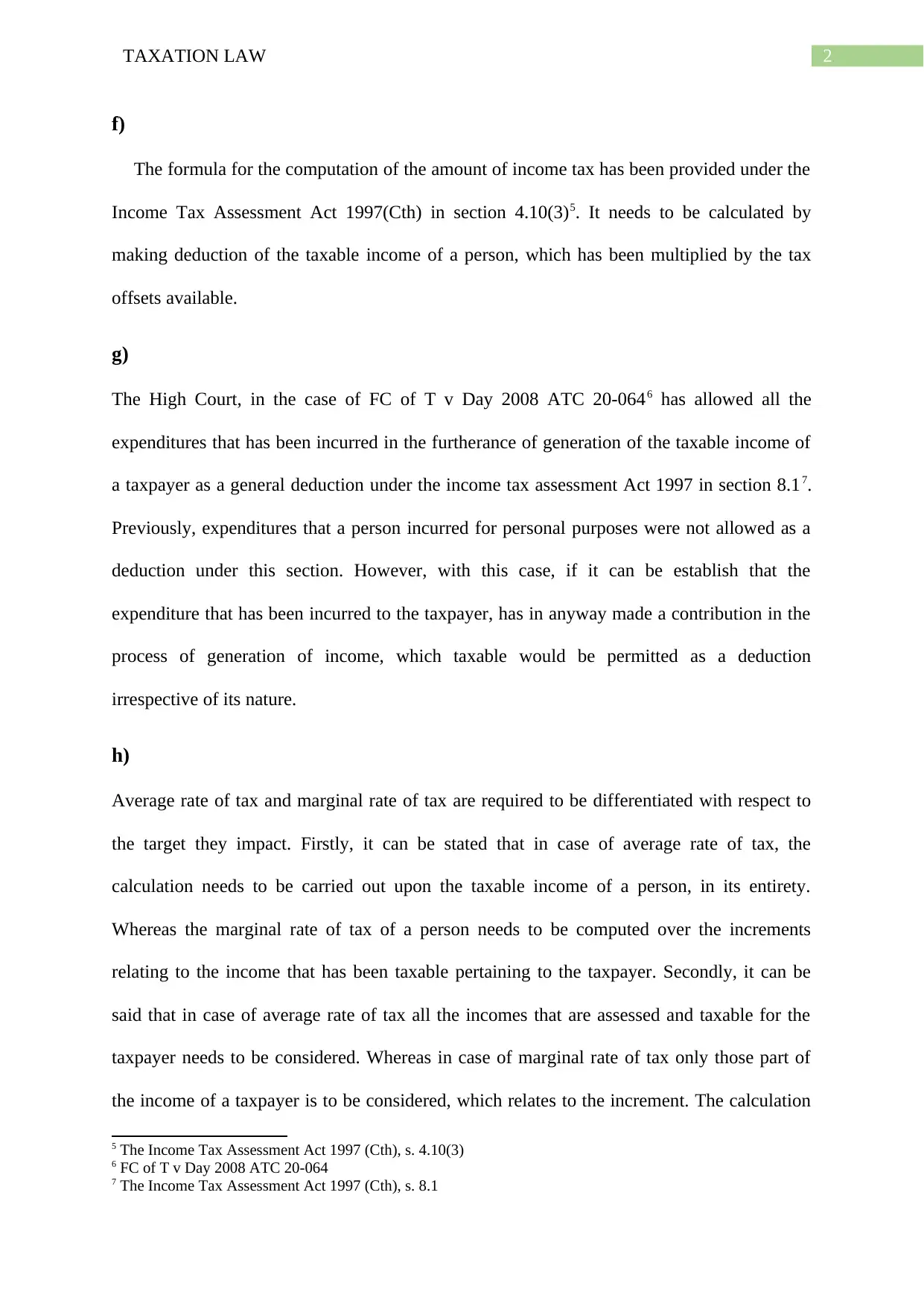
2TAXATION LAW
f)
The formula for the computation of the amount of income tax has been provided under the
Income Tax Assessment Act 1997(Cth) in section 4.10(3)5. It needs to be calculated by
making deduction of the taxable income of a person, which has been multiplied by the tax
offsets available.
g)
The High Court, in the case of FC of T v Day 2008 ATC 20-0646 has allowed all the
expenditures that has been incurred in the furtherance of generation of the taxable income of
a taxpayer as a general deduction under the income tax assessment Act 1997 in section 8.17.
Previously, expenditures that a person incurred for personal purposes were not allowed as a
deduction under this section. However, with this case, if it can be establish that the
expenditure that has been incurred to the taxpayer, has in anyway made a contribution in the
process of generation of income, which taxable would be permitted as a deduction
irrespective of its nature.
h)
Average rate of tax and marginal rate of tax are required to be differentiated with respect to
the target they impact. Firstly, it can be stated that in case of average rate of tax, the
calculation needs to be carried out upon the taxable income of a person, in its entirety.
Whereas the marginal rate of tax of a person needs to be computed over the increments
relating to the income that has been taxable pertaining to the taxpayer. Secondly, it can be
said that in case of average rate of tax all the incomes that are assessed and taxable for the
taxpayer needs to be considered. Whereas in case of marginal rate of tax only those part of
the income of a taxpayer is to be considered, which relates to the increment. The calculation
5 The Income Tax Assessment Act 1997 (Cth), s. 4.10(3)
6 FC of T v Day 2008 ATC 20-064
7 The Income Tax Assessment Act 1997 (Cth), s. 8.1
f)
The formula for the computation of the amount of income tax has been provided under the
Income Tax Assessment Act 1997(Cth) in section 4.10(3)5. It needs to be calculated by
making deduction of the taxable income of a person, which has been multiplied by the tax
offsets available.
g)
The High Court, in the case of FC of T v Day 2008 ATC 20-0646 has allowed all the
expenditures that has been incurred in the furtherance of generation of the taxable income of
a taxpayer as a general deduction under the income tax assessment Act 1997 in section 8.17.
Previously, expenditures that a person incurred for personal purposes were not allowed as a
deduction under this section. However, with this case, if it can be establish that the
expenditure that has been incurred to the taxpayer, has in anyway made a contribution in the
process of generation of income, which taxable would be permitted as a deduction
irrespective of its nature.
h)
Average rate of tax and marginal rate of tax are required to be differentiated with respect to
the target they impact. Firstly, it can be stated that in case of average rate of tax, the
calculation needs to be carried out upon the taxable income of a person, in its entirety.
Whereas the marginal rate of tax of a person needs to be computed over the increments
relating to the income that has been taxable pertaining to the taxpayer. Secondly, it can be
said that in case of average rate of tax all the incomes that are assessed and taxable for the
taxpayer needs to be considered. Whereas in case of marginal rate of tax only those part of
the income of a taxpayer is to be considered, which relates to the increment. The calculation
5 The Income Tax Assessment Act 1997 (Cth), s. 4.10(3)
6 FC of T v Day 2008 ATC 20-064
7 The Income Tax Assessment Act 1997 (Cth), s. 8.1
⊘ This is a preview!⊘
Do you want full access?
Subscribe today to unlock all pages.

Trusted by 1+ million students worldwide
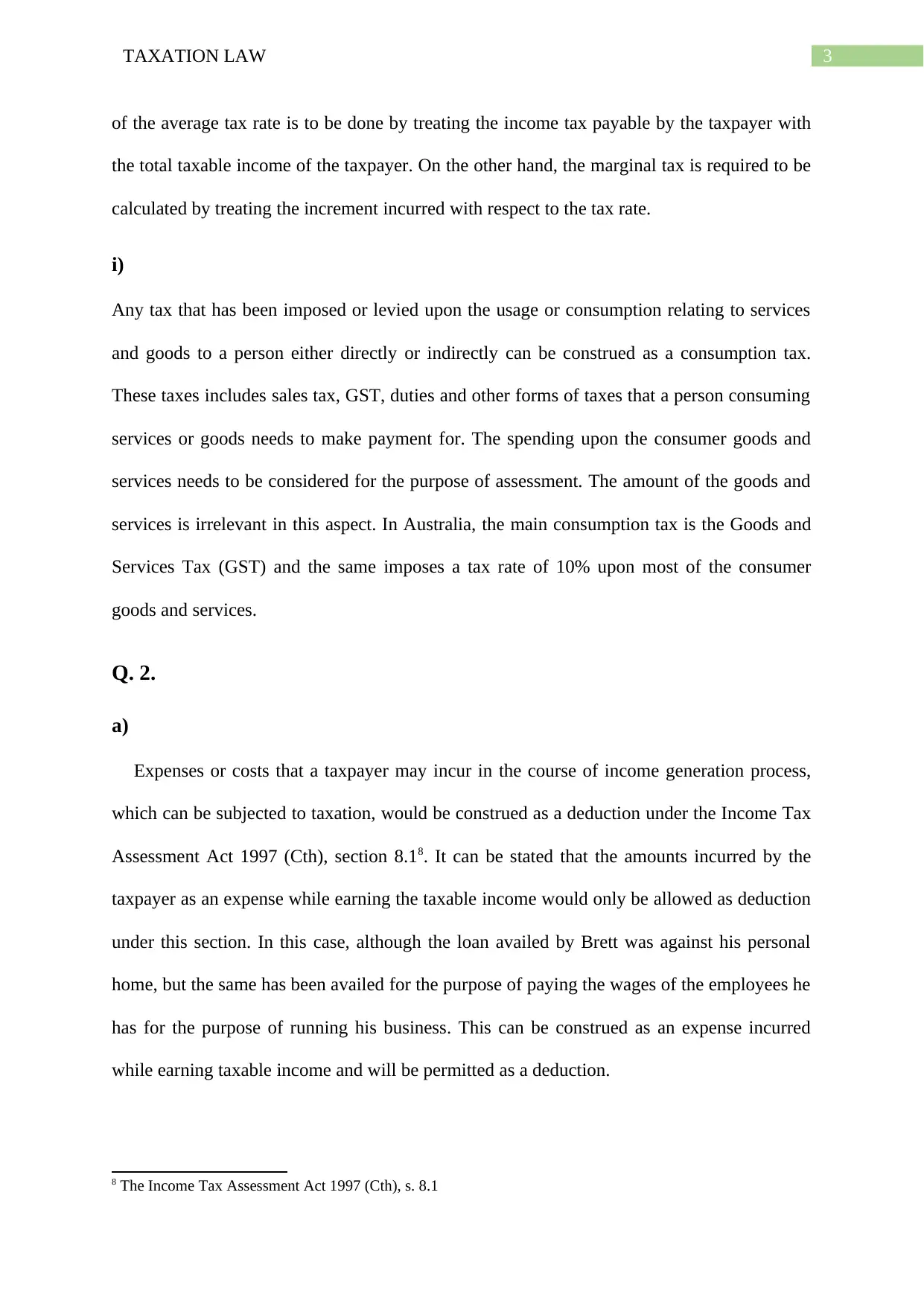
3TAXATION LAW
of the average tax rate is to be done by treating the income tax payable by the taxpayer with
the total taxable income of the taxpayer. On the other hand, the marginal tax is required to be
calculated by treating the increment incurred with respect to the tax rate.
i)
Any tax that has been imposed or levied upon the usage or consumption relating to services
and goods to a person either directly or indirectly can be construed as a consumption tax.
These taxes includes sales tax, GST, duties and other forms of taxes that a person consuming
services or goods needs to make payment for. The spending upon the consumer goods and
services needs to be considered for the purpose of assessment. The amount of the goods and
services is irrelevant in this aspect. In Australia, the main consumption tax is the Goods and
Services Tax (GST) and the same imposes a tax rate of 10% upon most of the consumer
goods and services.
Q. 2.
a)
Expenses or costs that a taxpayer may incur in the course of income generation process,
which can be subjected to taxation, would be construed as a deduction under the Income Tax
Assessment Act 1997 (Cth), section 8.18. It can be stated that the amounts incurred by the
taxpayer as an expense while earning the taxable income would only be allowed as deduction
under this section. In this case, although the loan availed by Brett was against his personal
home, but the same has been availed for the purpose of paying the wages of the employees he
has for the purpose of running his business. This can be construed as an expense incurred
while earning taxable income and will be permitted as a deduction.
8 The Income Tax Assessment Act 1997 (Cth), s. 8.1
of the average tax rate is to be done by treating the income tax payable by the taxpayer with
the total taxable income of the taxpayer. On the other hand, the marginal tax is required to be
calculated by treating the increment incurred with respect to the tax rate.
i)
Any tax that has been imposed or levied upon the usage or consumption relating to services
and goods to a person either directly or indirectly can be construed as a consumption tax.
These taxes includes sales tax, GST, duties and other forms of taxes that a person consuming
services or goods needs to make payment for. The spending upon the consumer goods and
services needs to be considered for the purpose of assessment. The amount of the goods and
services is irrelevant in this aspect. In Australia, the main consumption tax is the Goods and
Services Tax (GST) and the same imposes a tax rate of 10% upon most of the consumer
goods and services.
Q. 2.
a)
Expenses or costs that a taxpayer may incur in the course of income generation process,
which can be subjected to taxation, would be construed as a deduction under the Income Tax
Assessment Act 1997 (Cth), section 8.18. It can be stated that the amounts incurred by the
taxpayer as an expense while earning the taxable income would only be allowed as deduction
under this section. In this case, although the loan availed by Brett was against his personal
home, but the same has been availed for the purpose of paying the wages of the employees he
has for the purpose of running his business. This can be construed as an expense incurred
while earning taxable income and will be permitted as a deduction.
8 The Income Tax Assessment Act 1997 (Cth), s. 8.1
Paraphrase This Document
Need a fresh take? Get an instant paraphrase of this document with our AI Paraphraser
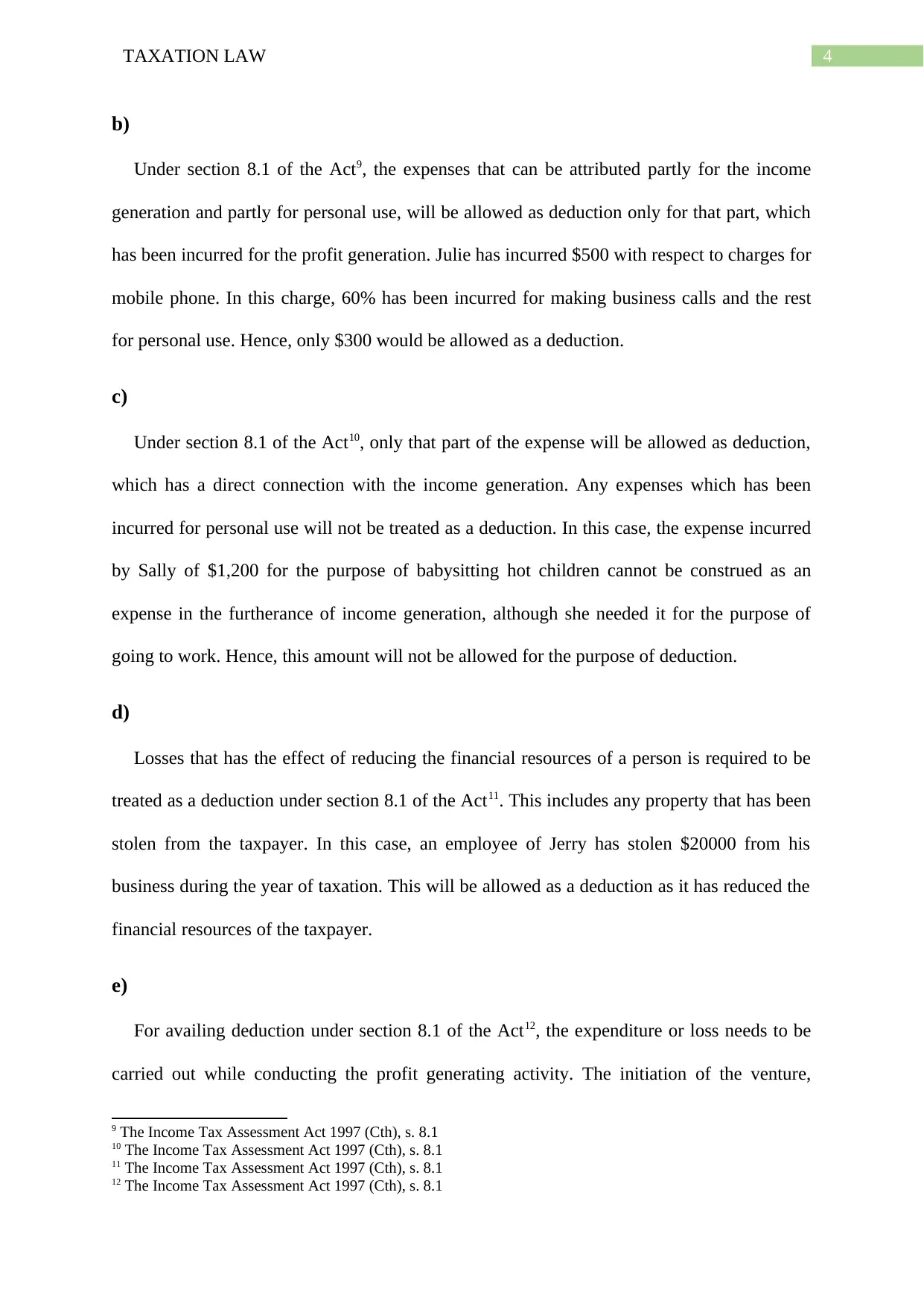
4TAXATION LAW
b)
Under section 8.1 of the Act9, the expenses that can be attributed partly for the income
generation and partly for personal use, will be allowed as deduction only for that part, which
has been incurred for the profit generation. Julie has incurred $500 with respect to charges for
mobile phone. In this charge, 60% has been incurred for making business calls and the rest
for personal use. Hence, only $300 would be allowed as a deduction.
c)
Under section 8.1 of the Act10, only that part of the expense will be allowed as deduction,
which has a direct connection with the income generation. Any expenses which has been
incurred for personal use will not be treated as a deduction. In this case, the expense incurred
by Sally of $1,200 for the purpose of babysitting hot children cannot be construed as an
expense in the furtherance of income generation, although she needed it for the purpose of
going to work. Hence, this amount will not be allowed for the purpose of deduction.
d)
Losses that has the effect of reducing the financial resources of a person is required to be
treated as a deduction under section 8.1 of the Act11. This includes any property that has been
stolen from the taxpayer. In this case, an employee of Jerry has stolen $20000 from his
business during the year of taxation. This will be allowed as a deduction as it has reduced the
financial resources of the taxpayer.
e)
For availing deduction under section 8.1 of the Act12, the expenditure or loss needs to be
carried out while conducting the profit generating activity. The initiation of the venture,
9 The Income Tax Assessment Act 1997 (Cth), s. 8.1
10 The Income Tax Assessment Act 1997 (Cth), s. 8.1
11 The Income Tax Assessment Act 1997 (Cth), s. 8.1
12 The Income Tax Assessment Act 1997 (Cth), s. 8.1
b)
Under section 8.1 of the Act9, the expenses that can be attributed partly for the income
generation and partly for personal use, will be allowed as deduction only for that part, which
has been incurred for the profit generation. Julie has incurred $500 with respect to charges for
mobile phone. In this charge, 60% has been incurred for making business calls and the rest
for personal use. Hence, only $300 would be allowed as a deduction.
c)
Under section 8.1 of the Act10, only that part of the expense will be allowed as deduction,
which has a direct connection with the income generation. Any expenses which has been
incurred for personal use will not be treated as a deduction. In this case, the expense incurred
by Sally of $1,200 for the purpose of babysitting hot children cannot be construed as an
expense in the furtherance of income generation, although she needed it for the purpose of
going to work. Hence, this amount will not be allowed for the purpose of deduction.
d)
Losses that has the effect of reducing the financial resources of a person is required to be
treated as a deduction under section 8.1 of the Act11. This includes any property that has been
stolen from the taxpayer. In this case, an employee of Jerry has stolen $20000 from his
business during the year of taxation. This will be allowed as a deduction as it has reduced the
financial resources of the taxpayer.
e)
For availing deduction under section 8.1 of the Act12, the expenditure or loss needs to be
carried out while conducting the profit generating activity. The initiation of the venture,
9 The Income Tax Assessment Act 1997 (Cth), s. 8.1
10 The Income Tax Assessment Act 1997 (Cth), s. 8.1
11 The Income Tax Assessment Act 1997 (Cth), s. 8.1
12 The Income Tax Assessment Act 1997 (Cth), s. 8.1
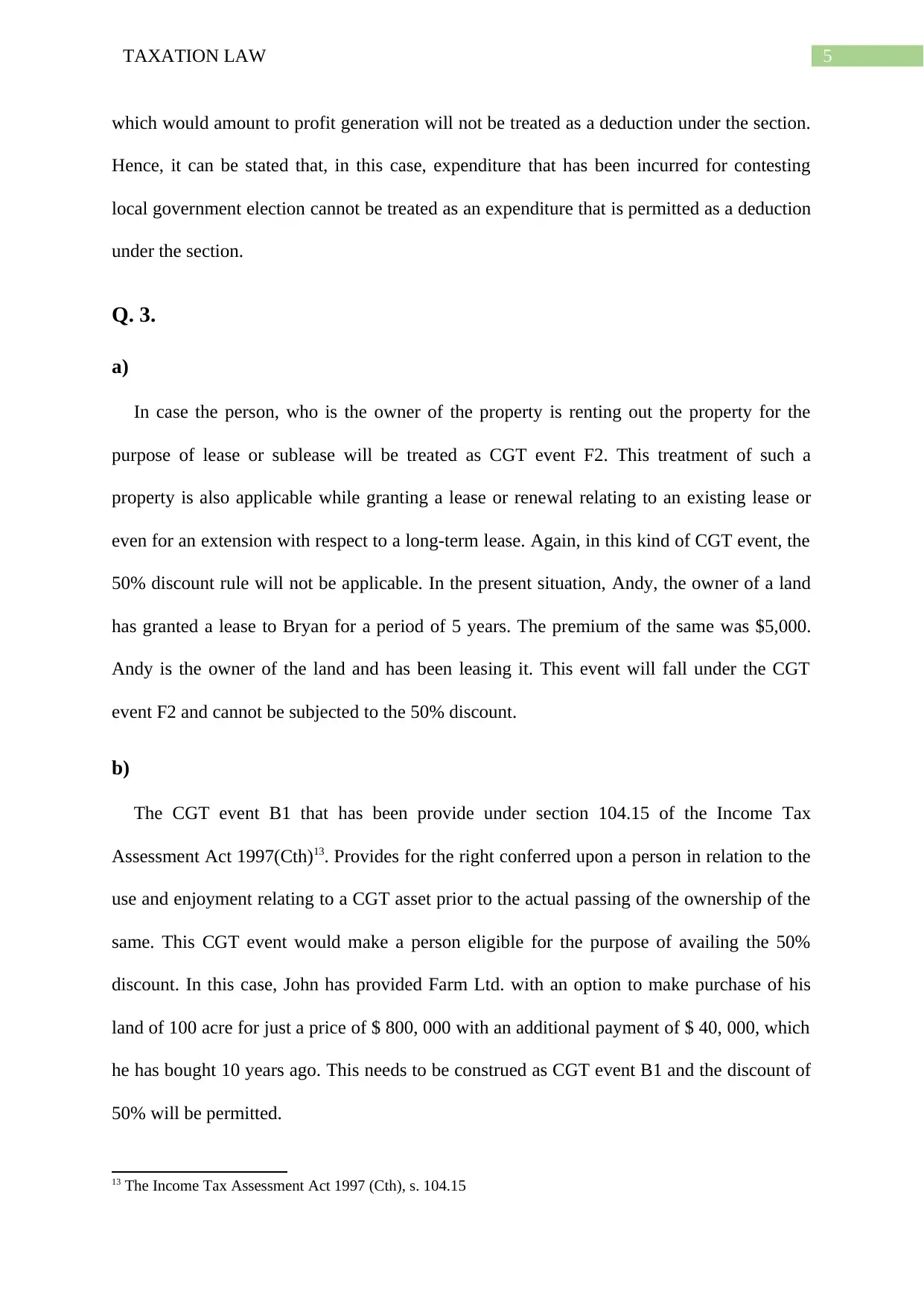
5TAXATION LAW
which would amount to profit generation will not be treated as a deduction under the section.
Hence, it can be stated that, in this case, expenditure that has been incurred for contesting
local government election cannot be treated as an expenditure that is permitted as a deduction
under the section.
Q. 3.
a)
In case the person, who is the owner of the property is renting out the property for the
purpose of lease or sublease will be treated as CGT event F2. This treatment of such a
property is also applicable while granting a lease or renewal relating to an existing lease or
even for an extension with respect to a long-term lease. Again, in this kind of CGT event, the
50% discount rule will not be applicable. In the present situation, Andy, the owner of a land
has granted a lease to Bryan for a period of 5 years. The premium of the same was $5,000.
Andy is the owner of the land and has been leasing it. This event will fall under the CGT
event F2 and cannot be subjected to the 50% discount.
b)
The CGT event B1 that has been provide under section 104.15 of the Income Tax
Assessment Act 1997(Cth)13. Provides for the right conferred upon a person in relation to the
use and enjoyment relating to a CGT asset prior to the actual passing of the ownership of the
same. This CGT event would make a person eligible for the purpose of availing the 50%
discount. In this case, John has provided Farm Ltd. with an option to make purchase of his
land of 100 acre for just a price of $ 800, 000 with an additional payment of $ 40, 000, which
he has bought 10 years ago. This needs to be construed as CGT event B1 and the discount of
50% will be permitted.
13 The Income Tax Assessment Act 1997 (Cth), s. 104.15
which would amount to profit generation will not be treated as a deduction under the section.
Hence, it can be stated that, in this case, expenditure that has been incurred for contesting
local government election cannot be treated as an expenditure that is permitted as a deduction
under the section.
Q. 3.
a)
In case the person, who is the owner of the property is renting out the property for the
purpose of lease or sublease will be treated as CGT event F2. This treatment of such a
property is also applicable while granting a lease or renewal relating to an existing lease or
even for an extension with respect to a long-term lease. Again, in this kind of CGT event, the
50% discount rule will not be applicable. In the present situation, Andy, the owner of a land
has granted a lease to Bryan for a period of 5 years. The premium of the same was $5,000.
Andy is the owner of the land and has been leasing it. This event will fall under the CGT
event F2 and cannot be subjected to the 50% discount.
b)
The CGT event B1 that has been provide under section 104.15 of the Income Tax
Assessment Act 1997(Cth)13. Provides for the right conferred upon a person in relation to the
use and enjoyment relating to a CGT asset prior to the actual passing of the ownership of the
same. This CGT event would make a person eligible for the purpose of availing the 50%
discount. In this case, John has provided Farm Ltd. with an option to make purchase of his
land of 100 acre for just a price of $ 800, 000 with an additional payment of $ 40, 000, which
he has bought 10 years ago. This needs to be construed as CGT event B1 and the discount of
50% will be permitted.
13 The Income Tax Assessment Act 1997 (Cth), s. 104.15
⊘ This is a preview!⊘
Do you want full access?
Subscribe today to unlock all pages.

Trusted by 1+ million students worldwide
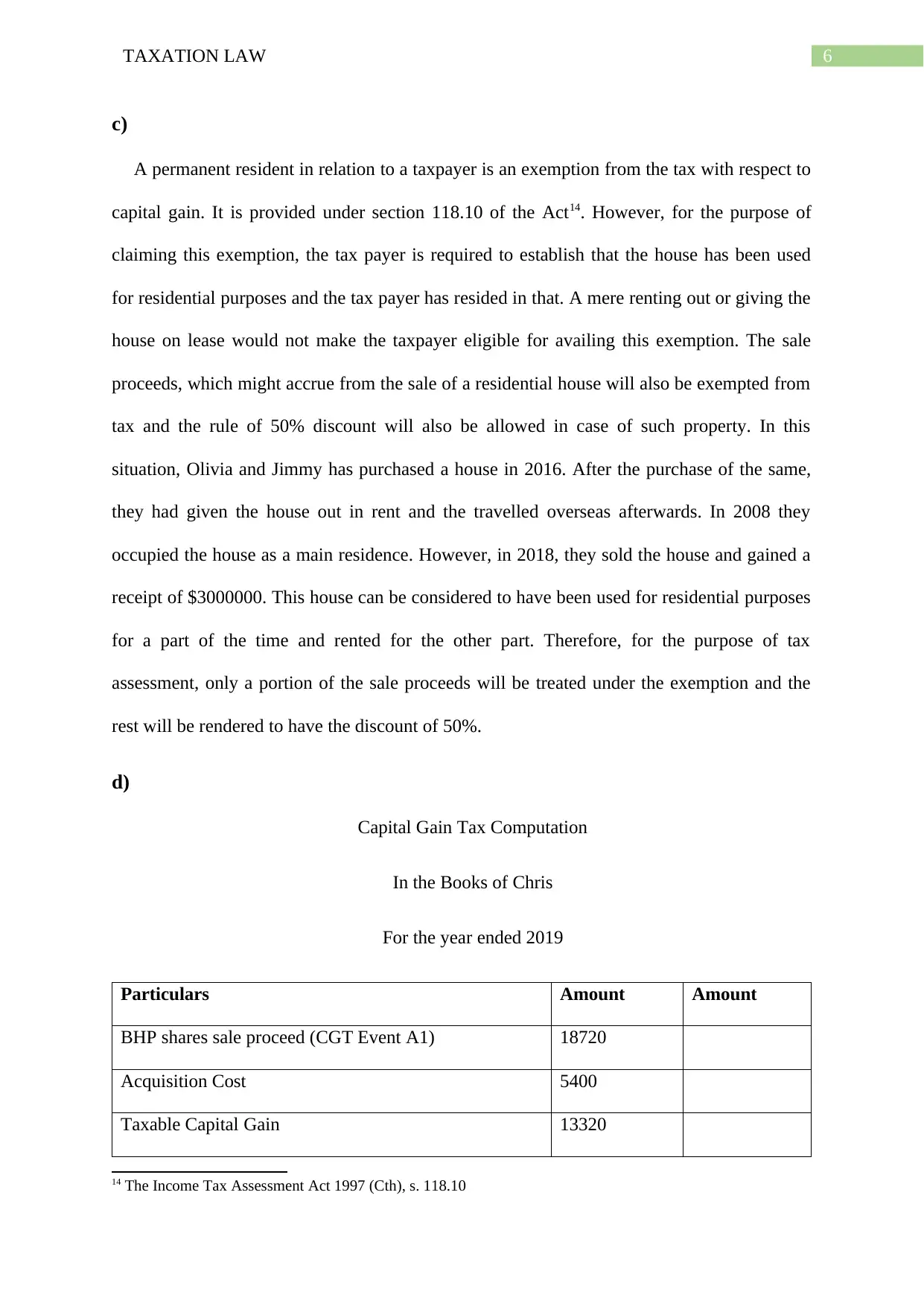
6TAXATION LAW
c)
A permanent resident in relation to a taxpayer is an exemption from the tax with respect to
capital gain. It is provided under section 118.10 of the Act14. However, for the purpose of
claiming this exemption, the tax payer is required to establish that the house has been used
for residential purposes and the tax payer has resided in that. A mere renting out or giving the
house on lease would not make the taxpayer eligible for availing this exemption. The sale
proceeds, which might accrue from the sale of a residential house will also be exempted from
tax and the rule of 50% discount will also be allowed in case of such property. In this
situation, Olivia and Jimmy has purchased a house in 2016. After the purchase of the same,
they had given the house out in rent and the travelled overseas afterwards. In 2008 they
occupied the house as a main residence. However, in 2018, they sold the house and gained a
receipt of $3000000. This house can be considered to have been used for residential purposes
for a part of the time and rented for the other part. Therefore, for the purpose of tax
assessment, only a portion of the sale proceeds will be treated under the exemption and the
rest will be rendered to have the discount of 50%.
d)
Capital Gain Tax Computation
In the Books of Chris
For the year ended 2019
Particulars Amount Amount
BHP shares sale proceed (CGT Event A1) 18720
Acquisition Cost 5400
Taxable Capital Gain 13320
14 The Income Tax Assessment Act 1997 (Cth), s. 118.10
c)
A permanent resident in relation to a taxpayer is an exemption from the tax with respect to
capital gain. It is provided under section 118.10 of the Act14. However, for the purpose of
claiming this exemption, the tax payer is required to establish that the house has been used
for residential purposes and the tax payer has resided in that. A mere renting out or giving the
house on lease would not make the taxpayer eligible for availing this exemption. The sale
proceeds, which might accrue from the sale of a residential house will also be exempted from
tax and the rule of 50% discount will also be allowed in case of such property. In this
situation, Olivia and Jimmy has purchased a house in 2016. After the purchase of the same,
they had given the house out in rent and the travelled overseas afterwards. In 2008 they
occupied the house as a main residence. However, in 2018, they sold the house and gained a
receipt of $3000000. This house can be considered to have been used for residential purposes
for a part of the time and rented for the other part. Therefore, for the purpose of tax
assessment, only a portion of the sale proceeds will be treated under the exemption and the
rest will be rendered to have the discount of 50%.
d)
Capital Gain Tax Computation
In the Books of Chris
For the year ended 2019
Particulars Amount Amount
BHP shares sale proceed (CGT Event A1) 18720
Acquisition Cost 5400
Taxable Capital Gain 13320
14 The Income Tax Assessment Act 1997 (Cth), s. 118.10
Paraphrase This Document
Need a fresh take? Get an instant paraphrase of this document with our AI Paraphraser
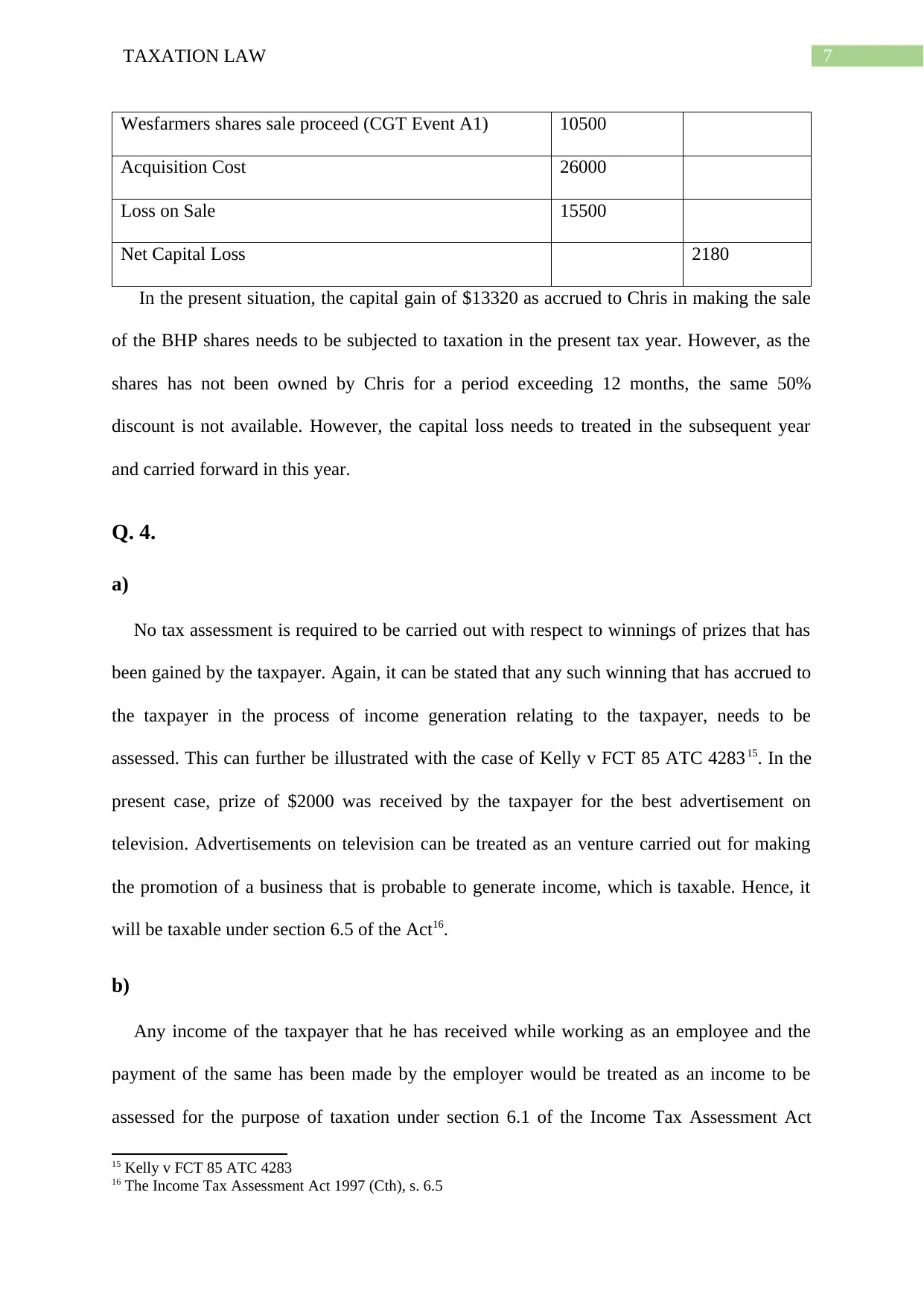
7TAXATION LAW
Wesfarmers shares sale proceed (CGT Event A1) 10500
Acquisition Cost 26000
Loss on Sale 15500
Net Capital Loss 2180
In the present situation, the capital gain of $13320 as accrued to Chris in making the sale
of the BHP shares needs to be subjected to taxation in the present tax year. However, as the
shares has not been owned by Chris for a period exceeding 12 months, the same 50%
discount is not available. However, the capital loss needs to treated in the subsequent year
and carried forward in this year.
Q. 4.
a)
No tax assessment is required to be carried out with respect to winnings of prizes that has
been gained by the taxpayer. Again, it can be stated that any such winning that has accrued to
the taxpayer in the process of income generation relating to the taxpayer, needs to be
assessed. This can further be illustrated with the case of Kelly v FCT 85 ATC 428315. In the
present case, prize of $2000 was received by the taxpayer for the best advertisement on
television. Advertisements on television can be treated as an venture carried out for making
the promotion of a business that is probable to generate income, which is taxable. Hence, it
will be taxable under section 6.5 of the Act16.
b)
Any income of the taxpayer that he has received while working as an employee and the
payment of the same has been made by the employer would be treated as an income to be
assessed for the purpose of taxation under section 6.1 of the Income Tax Assessment Act
15 Kelly v FCT 85 ATC 4283
16 The Income Tax Assessment Act 1997 (Cth), s. 6.5
Wesfarmers shares sale proceed (CGT Event A1) 10500
Acquisition Cost 26000
Loss on Sale 15500
Net Capital Loss 2180
In the present situation, the capital gain of $13320 as accrued to Chris in making the sale
of the BHP shares needs to be subjected to taxation in the present tax year. However, as the
shares has not been owned by Chris for a period exceeding 12 months, the same 50%
discount is not available. However, the capital loss needs to treated in the subsequent year
and carried forward in this year.
Q. 4.
a)
No tax assessment is required to be carried out with respect to winnings of prizes that has
been gained by the taxpayer. Again, it can be stated that any such winning that has accrued to
the taxpayer in the process of income generation relating to the taxpayer, needs to be
assessed. This can further be illustrated with the case of Kelly v FCT 85 ATC 428315. In the
present case, prize of $2000 was received by the taxpayer for the best advertisement on
television. Advertisements on television can be treated as an venture carried out for making
the promotion of a business that is probable to generate income, which is taxable. Hence, it
will be taxable under section 6.5 of the Act16.
b)
Any income of the taxpayer that he has received while working as an employee and the
payment of the same has been made by the employer would be treated as an income to be
assessed for the purpose of taxation under section 6.1 of the Income Tax Assessment Act
15 Kelly v FCT 85 ATC 4283
16 The Income Tax Assessment Act 1997 (Cth), s. 6.5
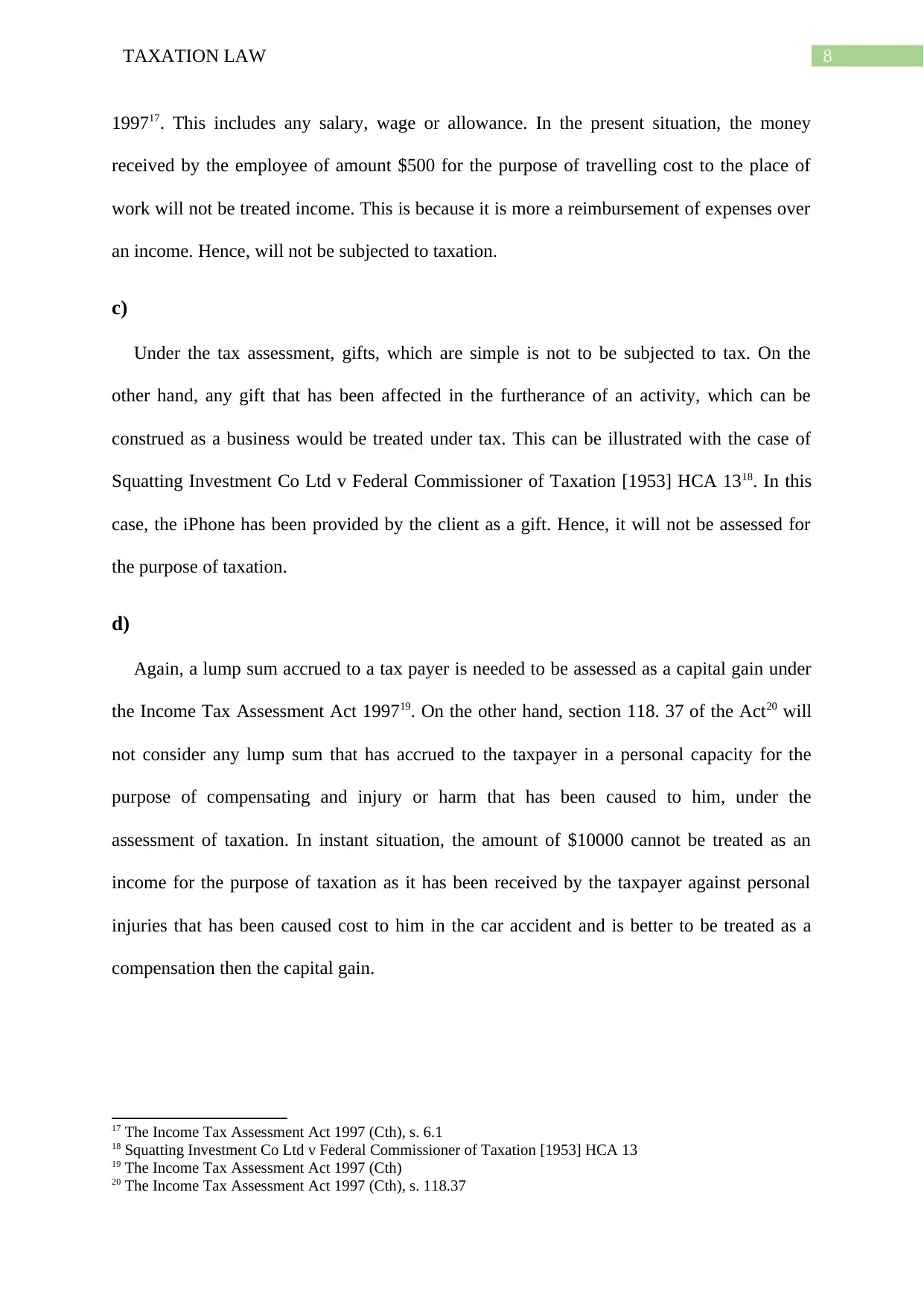
8TAXATION LAW
199717. This includes any salary, wage or allowance. In the present situation, the money
received by the employee of amount $500 for the purpose of travelling cost to the place of
work will not be treated income. This is because it is more a reimbursement of expenses over
an income. Hence, will not be subjected to taxation.
c)
Under the tax assessment, gifts, which are simple is not to be subjected to tax. On the
other hand, any gift that has been affected in the furtherance of an activity, which can be
construed as a business would be treated under tax. This can be illustrated with the case of
Squatting Investment Co Ltd v Federal Commissioner of Taxation [1953] HCA 1318. In this
case, the iPhone has been provided by the client as a gift. Hence, it will not be assessed for
the purpose of taxation.
d)
Again, a lump sum accrued to a tax payer is needed to be assessed as a capital gain under
the Income Tax Assessment Act 199719. On the other hand, section 118. 37 of the Act20 will
not consider any lump sum that has accrued to the taxpayer in a personal capacity for the
purpose of compensating and injury or harm that has been caused to him, under the
assessment of taxation. In instant situation, the amount of $10000 cannot be treated as an
income for the purpose of taxation as it has been received by the taxpayer against personal
injuries that has been caused cost to him in the car accident and is better to be treated as a
compensation then the capital gain.
17 The Income Tax Assessment Act 1997 (Cth), s. 6.1
18 Squatting Investment Co Ltd v Federal Commissioner of Taxation [1953] HCA 13
19 The Income Tax Assessment Act 1997 (Cth)
20 The Income Tax Assessment Act 1997 (Cth), s. 118.37
199717. This includes any salary, wage or allowance. In the present situation, the money
received by the employee of amount $500 for the purpose of travelling cost to the place of
work will not be treated income. This is because it is more a reimbursement of expenses over
an income. Hence, will not be subjected to taxation.
c)
Under the tax assessment, gifts, which are simple is not to be subjected to tax. On the
other hand, any gift that has been affected in the furtherance of an activity, which can be
construed as a business would be treated under tax. This can be illustrated with the case of
Squatting Investment Co Ltd v Federal Commissioner of Taxation [1953] HCA 1318. In this
case, the iPhone has been provided by the client as a gift. Hence, it will not be assessed for
the purpose of taxation.
d)
Again, a lump sum accrued to a tax payer is needed to be assessed as a capital gain under
the Income Tax Assessment Act 199719. On the other hand, section 118. 37 of the Act20 will
not consider any lump sum that has accrued to the taxpayer in a personal capacity for the
purpose of compensating and injury or harm that has been caused to him, under the
assessment of taxation. In instant situation, the amount of $10000 cannot be treated as an
income for the purpose of taxation as it has been received by the taxpayer against personal
injuries that has been caused cost to him in the car accident and is better to be treated as a
compensation then the capital gain.
17 The Income Tax Assessment Act 1997 (Cth), s. 6.1
18 Squatting Investment Co Ltd v Federal Commissioner of Taxation [1953] HCA 13
19 The Income Tax Assessment Act 1997 (Cth)
20 The Income Tax Assessment Act 1997 (Cth), s. 118.37
⊘ This is a preview!⊘
Do you want full access?
Subscribe today to unlock all pages.

Trusted by 1+ million students worldwide
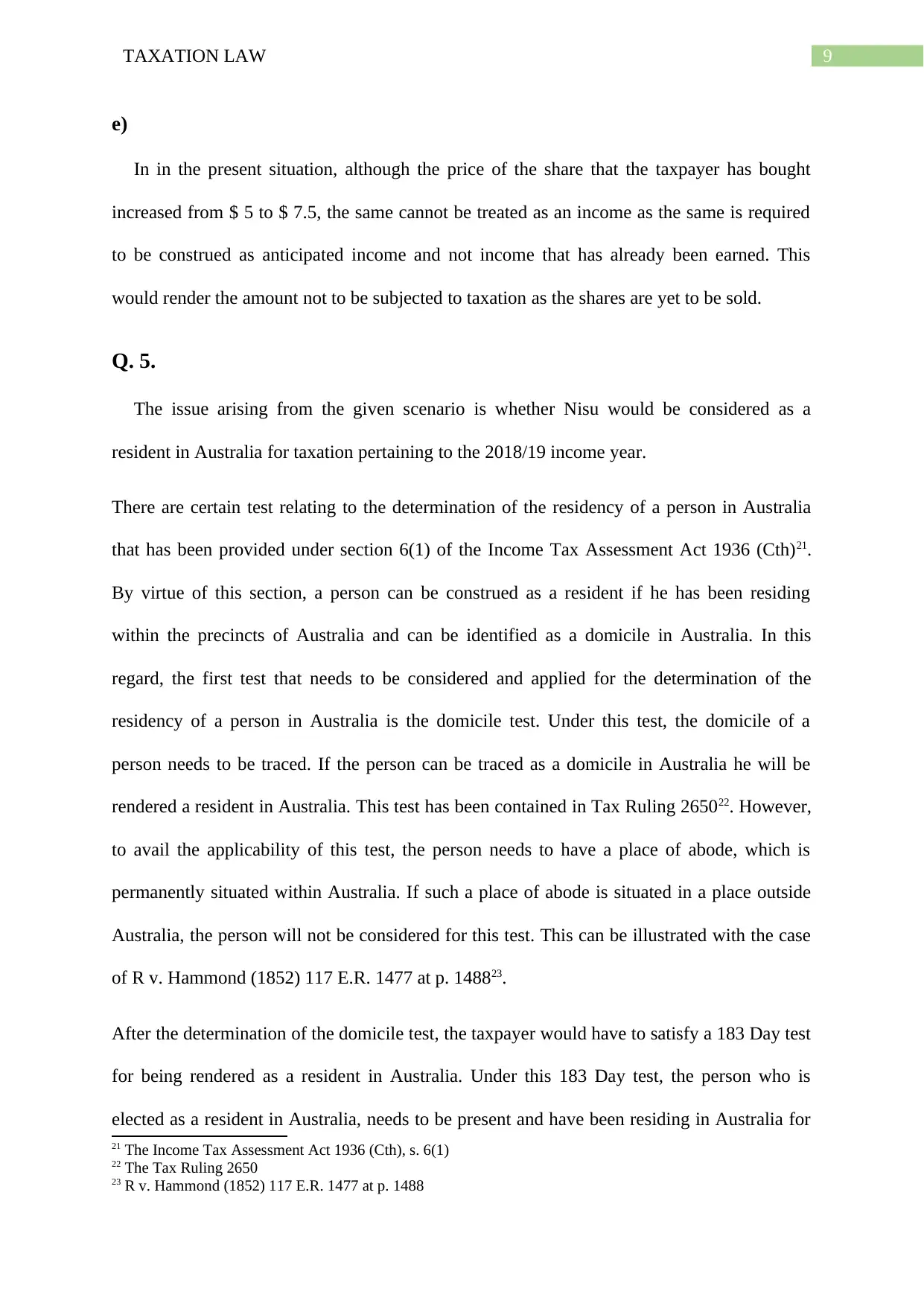
9TAXATION LAW
e)
In in the present situation, although the price of the share that the taxpayer has bought
increased from $ 5 to $ 7.5, the same cannot be treated as an income as the same is required
to be construed as anticipated income and not income that has already been earned. This
would render the amount not to be subjected to taxation as the shares are yet to be sold.
Q. 5.
The issue arising from the given scenario is whether Nisu would be considered as a
resident in Australia for taxation pertaining to the 2018/19 income year.
There are certain test relating to the determination of the residency of a person in Australia
that has been provided under section 6(1) of the Income Tax Assessment Act 1936 (Cth)21.
By virtue of this section, a person can be construed as a resident if he has been residing
within the precincts of Australia and can be identified as a domicile in Australia. In this
regard, the first test that needs to be considered and applied for the determination of the
residency of a person in Australia is the domicile test. Under this test, the domicile of a
person needs to be traced. If the person can be traced as a domicile in Australia he will be
rendered a resident in Australia. This test has been contained in Tax Ruling 265022. However,
to avail the applicability of this test, the person needs to have a place of abode, which is
permanently situated within Australia. If such a place of abode is situated in a place outside
Australia, the person will not be considered for this test. This can be illustrated with the case
of R v. Hammond (1852) 117 E.R. 1477 at p. 148823.
After the determination of the domicile test, the taxpayer would have to satisfy a 183 Day test
for being rendered as a resident in Australia. Under this 183 Day test, the person who is
elected as a resident in Australia, needs to be present and have been residing in Australia for
21 The Income Tax Assessment Act 1936 (Cth), s. 6(1)
22 The Tax Ruling 2650
23 R v. Hammond (1852) 117 E.R. 1477 at p. 1488
e)
In in the present situation, although the price of the share that the taxpayer has bought
increased from $ 5 to $ 7.5, the same cannot be treated as an income as the same is required
to be construed as anticipated income and not income that has already been earned. This
would render the amount not to be subjected to taxation as the shares are yet to be sold.
Q. 5.
The issue arising from the given scenario is whether Nisu would be considered as a
resident in Australia for taxation pertaining to the 2018/19 income year.
There are certain test relating to the determination of the residency of a person in Australia
that has been provided under section 6(1) of the Income Tax Assessment Act 1936 (Cth)21.
By virtue of this section, a person can be construed as a resident if he has been residing
within the precincts of Australia and can be identified as a domicile in Australia. In this
regard, the first test that needs to be considered and applied for the determination of the
residency of a person in Australia is the domicile test. Under this test, the domicile of a
person needs to be traced. If the person can be traced as a domicile in Australia he will be
rendered a resident in Australia. This test has been contained in Tax Ruling 265022. However,
to avail the applicability of this test, the person needs to have a place of abode, which is
permanently situated within Australia. If such a place of abode is situated in a place outside
Australia, the person will not be considered for this test. This can be illustrated with the case
of R v. Hammond (1852) 117 E.R. 1477 at p. 148823.
After the determination of the domicile test, the taxpayer would have to satisfy a 183 Day test
for being rendered as a resident in Australia. Under this 183 Day test, the person who is
elected as a resident in Australia, needs to be present and have been residing in Australia for
21 The Income Tax Assessment Act 1936 (Cth), s. 6(1)
22 The Tax Ruling 2650
23 R v. Hammond (1852) 117 E.R. 1477 at p. 1488
Paraphrase This Document
Need a fresh take? Get an instant paraphrase of this document with our AI Paraphraser
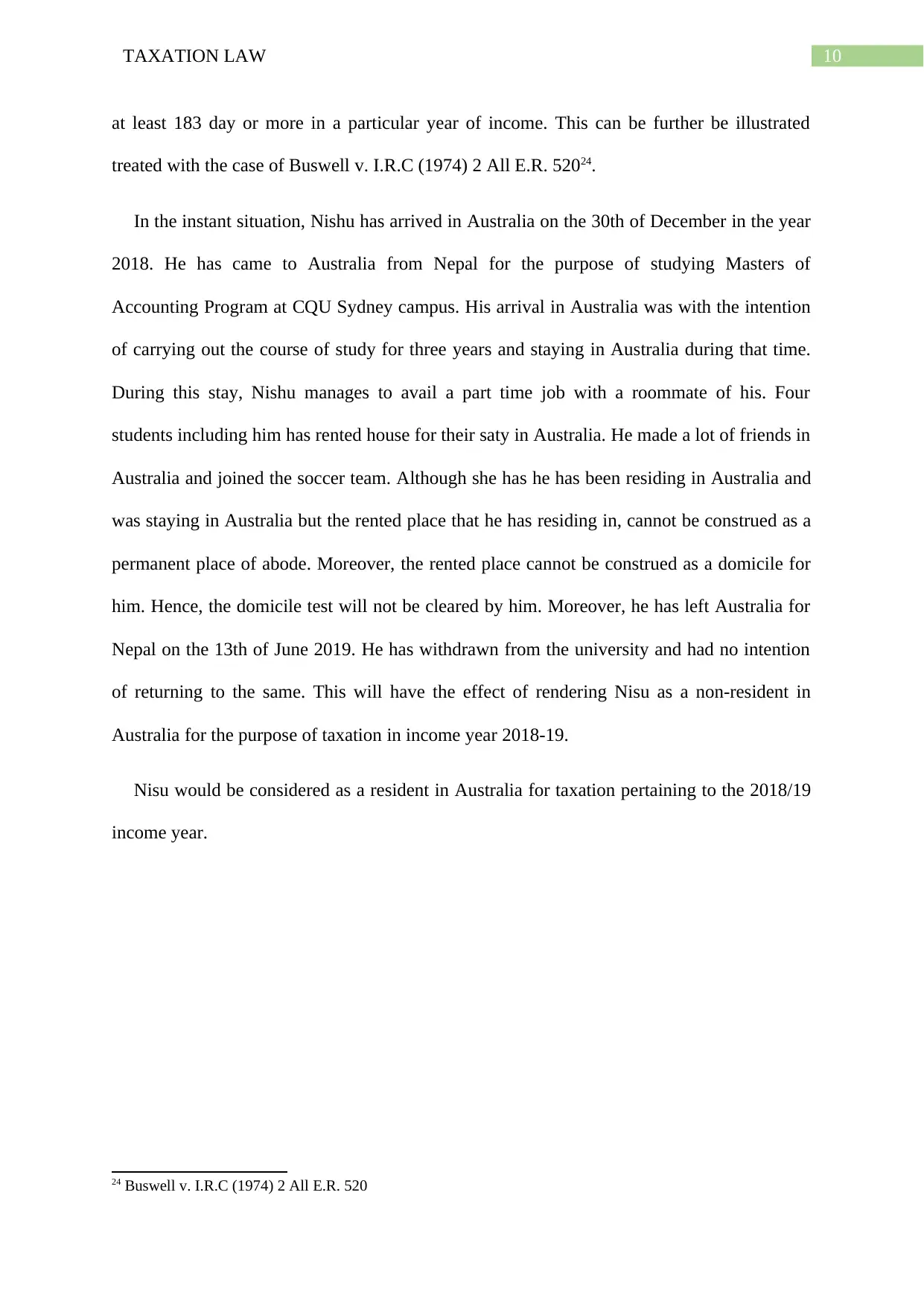
10TAXATION LAW
at least 183 day or more in a particular year of income. This can be further be illustrated
treated with the case of Buswell v. I.R.C (1974) 2 All E.R. 52024.
In the instant situation, Nishu has arrived in Australia on the 30th of December in the year
2018. He has came to Australia from Nepal for the purpose of studying Masters of
Accounting Program at CQU Sydney campus. His arrival in Australia was with the intention
of carrying out the course of study for three years and staying in Australia during that time.
During this stay, Nishu manages to avail a part time job with a roommate of his. Four
students including him has rented house for their saty in Australia. He made a lot of friends in
Australia and joined the soccer team. Although she has he has been residing in Australia and
was staying in Australia but the rented place that he has residing in, cannot be construed as a
permanent place of abode. Moreover, the rented place cannot be construed as a domicile for
him. Hence, the domicile test will not be cleared by him. Moreover, he has left Australia for
Nepal on the 13th of June 2019. He has withdrawn from the university and had no intention
of returning to the same. This will have the effect of rendering Nisu as a non-resident in
Australia for the purpose of taxation in income year 2018-19.
Nisu would be considered as a resident in Australia for taxation pertaining to the 2018/19
income year.
24 Buswell v. I.R.C (1974) 2 All E.R. 520
at least 183 day or more in a particular year of income. This can be further be illustrated
treated with the case of Buswell v. I.R.C (1974) 2 All E.R. 52024.
In the instant situation, Nishu has arrived in Australia on the 30th of December in the year
2018. He has came to Australia from Nepal for the purpose of studying Masters of
Accounting Program at CQU Sydney campus. His arrival in Australia was with the intention
of carrying out the course of study for three years and staying in Australia during that time.
During this stay, Nishu manages to avail a part time job with a roommate of his. Four
students including him has rented house for their saty in Australia. He made a lot of friends in
Australia and joined the soccer team. Although she has he has been residing in Australia and
was staying in Australia but the rented place that he has residing in, cannot be construed as a
permanent place of abode. Moreover, the rented place cannot be construed as a domicile for
him. Hence, the domicile test will not be cleared by him. Moreover, he has left Australia for
Nepal on the 13th of June 2019. He has withdrawn from the university and had no intention
of returning to the same. This will have the effect of rendering Nisu as a non-resident in
Australia for the purpose of taxation in income year 2018-19.
Nisu would be considered as a resident in Australia for taxation pertaining to the 2018/19
income year.
24 Buswell v. I.R.C (1974) 2 All E.R. 520
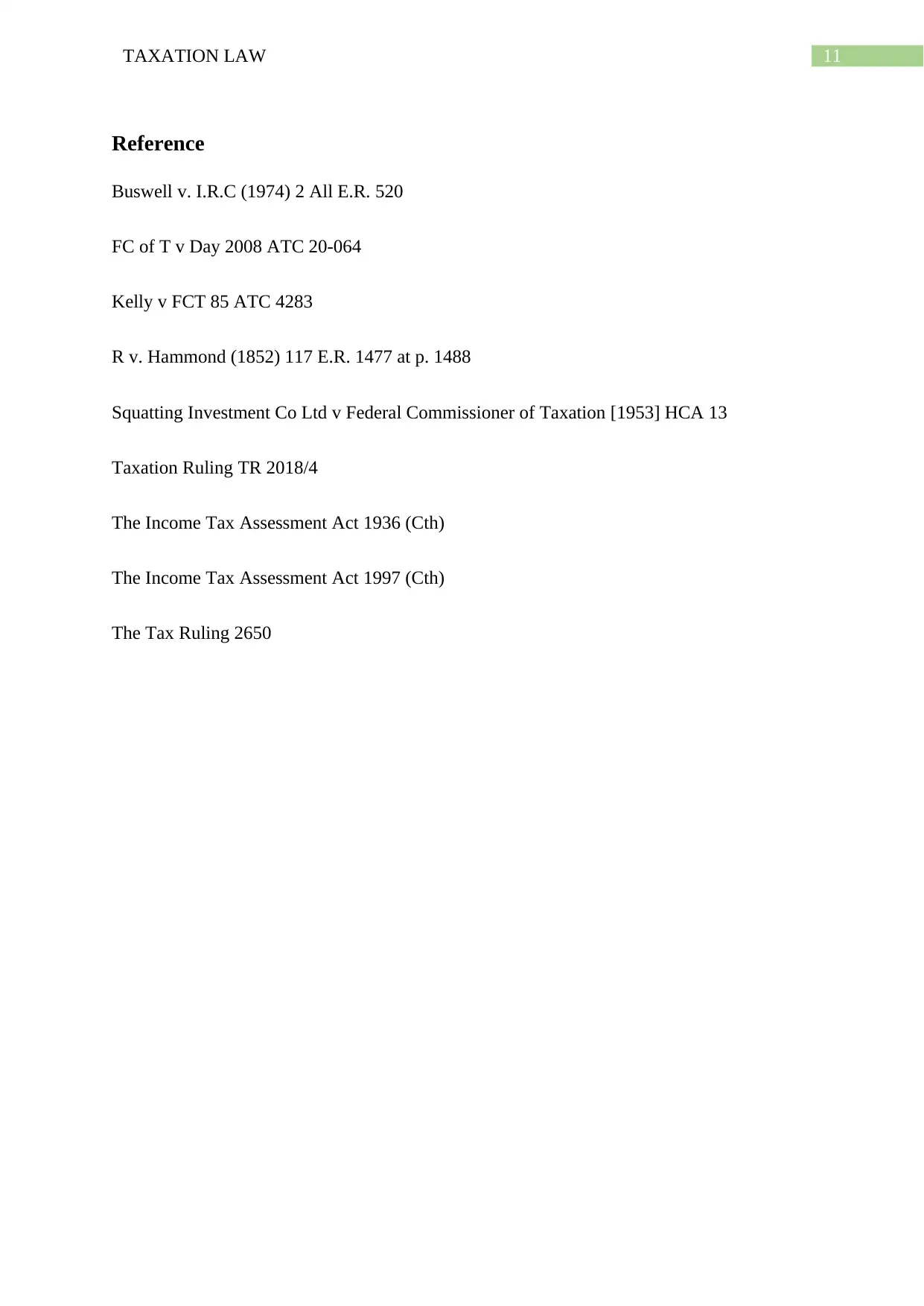
11TAXATION LAW
Reference
Buswell v. I.R.C (1974) 2 All E.R. 520
FC of T v Day 2008 ATC 20-064
Kelly v FCT 85 ATC 4283
R v. Hammond (1852) 117 E.R. 1477 at p. 1488
Squatting Investment Co Ltd v Federal Commissioner of Taxation [1953] HCA 13
Taxation Ruling TR 2018/4
The Income Tax Assessment Act 1936 (Cth)
The Income Tax Assessment Act 1997 (Cth)
The Tax Ruling 2650
Reference
Buswell v. I.R.C (1974) 2 All E.R. 520
FC of T v Day 2008 ATC 20-064
Kelly v FCT 85 ATC 4283
R v. Hammond (1852) 117 E.R. 1477 at p. 1488
Squatting Investment Co Ltd v Federal Commissioner of Taxation [1953] HCA 13
Taxation Ruling TR 2018/4
The Income Tax Assessment Act 1936 (Cth)
The Income Tax Assessment Act 1997 (Cth)
The Tax Ruling 2650
⊘ This is a preview!⊘
Do you want full access?
Subscribe today to unlock all pages.

Trusted by 1+ million students worldwide
1 out of 12
Related Documents
Your All-in-One AI-Powered Toolkit for Academic Success.
+13062052269
info@desklib.com
Available 24*7 on WhatsApp / Email
![[object Object]](/_next/static/media/star-bottom.7253800d.svg)
Unlock your academic potential
Copyright © 2020–2026 A2Z Services. All Rights Reserved. Developed and managed by ZUCOL.





